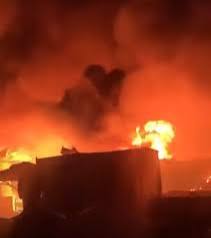By Alex Ababio
TECHIMAN, Ghana—The acrid scent of burnt shea butter still clings to Ama Serwah’s hands six months after her life evaporated. “I stood right here watching flames swallow 20 years of work,” she says, kicking a twisted metal frame that once held her savings. “No water came. Only smoke and lies.” Her stall at Techiman Market’s Butubutu corner vanished on January 12, 2025—one of *seven infernos* that raged across Ghana in 30 days, devouring livelihoods while climate change turned neglect into catastrophe .
Climate’s Tinderbox
Harmattan winds—hotter, drier, and arriving weeks earlier than decades past—whipped through market lanes where illegal wires dangled like fuses. “That morning felt like a furnace,” recalls fish trader Afua Mensah, whose freezer short-circuited as temperatures hit 42°C (107°F). “Sparks flew from overloaded meters. Then screams.” Firefighters arrived too late, their lone truck for 11 districts drained of water. “Our tanks were empty,” admitted Sub-Officer Azabu in a leaked report. “We watched Butubutu burn” .
The pattern repeated nationwide:
– Katamanto Market (Accra) : 1,200 women traders bankrupted as flames fed on combustible waste piles
– *Kejetia Market (Ashanti)*: West Africa’s largest trading hub partially collapsed after faulty wiring ignited dried cocoa husks
– *Tamale Timber Market*: 90% destroyed as winds gusted at **35km/h** over parched wood stocks
The Arithmetic of Abandonment
When Ghana’s 2025 budget allocated *GH¢242.5 million* for Akosombo Dam spill victims and **GH¢200 million** for tidal wave relief, market fire survivors received zero cedis. “Political favors drown us while we burn,”MP Fatahiya Abdul Aziz MP for Savelugu declared in Parliament. Her data exposed the bias: 98% of market traders are women, yet disaster funds flowed to male-dominated sectors .
Ama’s losses crystallize the injustice: GH¢18,000 in incinerated shea butter stocks, her daughter’s nursing school fees vaporized. “The President gave Katamanto survivors GH¢833 each,” economist Dr. Akosua Mensah calculates. “But average losses hit GH¢21,000 . This isn’t relief—it’s betrayal” .
Climate’s Vicious Cycle
The fires reveal a terrifying feedback loop: climate stress breeds disasters that deepen inequality As Hon. Michael AKwasi Aidoo, MP for Oforikrom warned Parliament, “Prolonged droughts turn markets into tinderboxes. Each blaze releases carbon that heats our world further” .
For Techiman’s women, this cycle is visceral:
– Rusting fire hydrants buried under illegal stalls—unusable during the blaze
– Single fire truck paralyzed without water access as temperatures soared
– $125.9 million World Bank “resilience” grant** approved weeks later—zero allocated for fire prevention
“After the first fire, we begged for sprinklers,” says Ama, unfolding a petition with 300 thumbprints. “Officials took photos, promised help. When the second fire came? Only ashes answered.”
Daughters of the Ashes
The true cost emerges in Ama’s home:
– Adwoa, 17 : Nursing school dreams replaced by selling sachet water at traffic lights
– Esi, 9 : Coughs violently through nights scarred by smoke-damaged lungs
“Before the flames, Mama paid my fees,” Adwoa whispers, stirring banku over a charcoal pot. “Now I count coins while classmates learn to save lives.” Her stethoscope hangs unused as asthma medication drains their income .
Rising from Embers
Yet in Techiman’s ruins, women forge solutions:
– The Phoenix Collective: 120 traders pooling pennies for fire-resistant roofing
– Ash Alert WhatsApp Group : Members report sparking wires before they ignite
“We lost stalls, not our minds,” Ama declares at a collective meeting. But when seeking loans, bankers dismiss charred land deeds as collateral. “No papers, no money,” one lender told her.
The bitter irony? Ghana’s Fire Service received new hydraulic platforms in 2022—parked hours away in Accra while Techiman burned .
The $125 Million Blind Spot
The World Bank’s April 2025 “Building Resilience” project exposed fatal priorities:
– $125.94 million for “digital farming advisories” and tomato greenhouse projects
– $0** for market fire infrastructure in climate-vulnerable zones
“Funding ‘climate-smart tomatoes’ while women trade in firetraps isn’t resilience—it’s cruelty,” storms climate justice advocate Nana Kwakye. “Policy ignores how climate poverty wears a woman’s face” .
“Agya! When Will You See Us?”
At the market’s skeletal remains, Ama confronted officials during a belated “sympathy tour”:
“My daughter breathes through a tube because your hydrants were graves,” she thrusts Esi’s inhaler at a stunned director. “Tell me: Why do ministers ride in armored SUVs while fire trucks rust? Why do disaster funds flow only where cameras go?”
Her questions hang over the ruins where shea butter once perfumed the air. As COP30 approaches, her warning echoes:
“We rebuilt Ghana after COVID. We’ll rebuild from ashes. But if leaders keep ignoring climate’s frontline soldiers, these flames will devour us all.”

